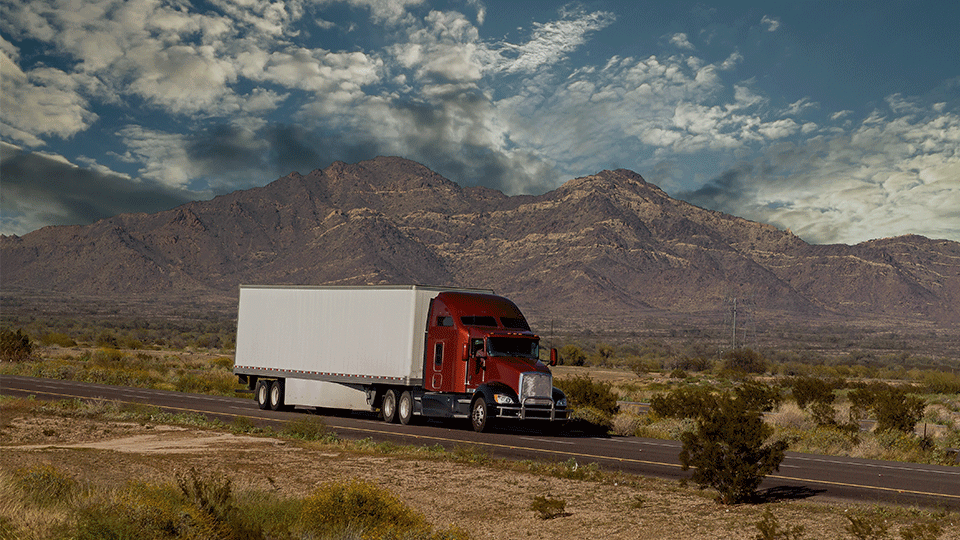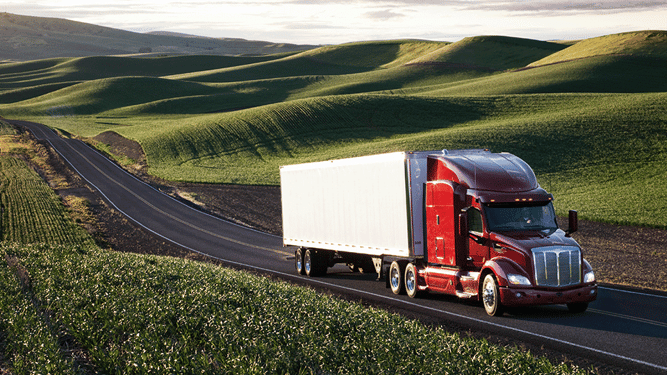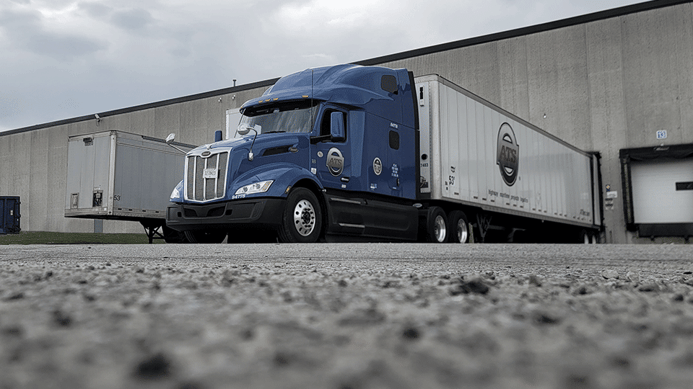
- The 10 largest truckload van carriers in 2025
- 5 tips for choosing the right dry van carrier for your business
Choosing the right dry van full truckload (FTL) carriers for your freight needs isn’t just about rates — it’s about reliability, capacity, and service quality.
As a shipper, you’re constantly balancing cost pressures, fluctuating demand, and the need to build a strong, diversified carrier network that won’t leave you scrambling when capacity tightens.
But with thousands of trucking companies operating across North America, it can be difficult to identify the players that will be the most capable and consistent for your freight.
Here at Anderson Trucking Service (ATS), we’ve been helping businesses move their full-truckload van freight since 1983. After 40 years in this space, we know which companies provide enclosed truckload services at the highest level.
To help streamline your search, we’ve compiled a list of the 10 largest truckload van carriers in 2025 — the companies moving the most freight, managing the most assets, and setting the industry standards for service.
The carriers on this list offer the scale, technology, and network coverage that can help stabilize your supply chain. But size alone doesn’t guarantee the right fit for your business, so we’ve included some additional tips for finding your best-fit provider.
Read on to see who made the list, what they bring to the table, and how to determine if they’re the right partners for your freight strategy.
10 Largest Truckload Van Carriers in 2025
We compiled our list of the 10 largest dry van full truckload carriers in 2025 by looking at the 2024 Top Truckload Carriers list compiled by Transport Topics and analyzing each carrier’s truck and trailer counts, revenue numbers (as reported by Transport Topics), and other key performance indicators.
Based on our analysis, these are the 10 truckload transportation companies that boast the biggest and busiest fleets of enclosed trailers in North America.
In alphabetical order:
- Crete Carrier
- CRST The Transportation Solution
- J.B. Hunt Transport Services
- Knight-Swift Transportation
- Landstar System
- Penske Logistics
- Ryder System
- Schneider
- TFI International
- Werner Enterprises
Note: Per Transport Topics, all tractor counts include any/all company-owned, lease-to-own, and owner-operator tractors.
Any additional sources will be cited at the bottom of that carrier’s feature.
Crete Carrier
Founded in 1966, Crete Carrier Corporation has grown into one of the nation's largest privately owned trucking companies. Its flagship division, Crete Carrier, specializes in dry van FTL freight transportation across the 48 contiguous states, operating from approximately two dozen terminals primarily in the Midwest and Southeast.
With a fleet exceeding 4,000 tractors and 10,500 53-foot trailers, Crete Carrier is equipped to handle a diverse range of dry van shipments, ensuring reliable and timely deliveries nationwide.
- Founded: 1966
- Headquarters: Lincoln, Neb.
- Tractors: 4,000+*
- Dry van trailers: 10,500 53-foot dry van trailers*
- 2024 Revenue: $1.34B (est.)
CRST The Transportation Solution
Like Crete Carrier, CRST The Transportation Solution, Inc. is one of the nation's largest privately-held transportation and logistics companies. It offers dry van and refrigerated (reefer) truckload transportation services, including dedicated and expedited service, with nationwide capacity.
Notably, CRST has been recognized for its excellence, winning the 2023 Quest for Quality awards in the Van Expedited Dry Freight categories.
- Founded: 1955
- Headquarters: Cedar Rapids, Iowa
- Tractors: 4,778
- Dry van trailers: Information not available
- 2024 Revenue: $1.35B (est.)
J.B. Hunt Transport Services
J.B. Hunt Transport Services has established itself as a leading transportation logistics company in North America. Its truckload division offers comprehensive dry van and temperature-controlled services, utilizing a fleet of company-owned assets and a vast network of qualified third-party carriers.
The company also offers flexible and scalable drop-and-hook capacity through J.B. Hunt 360box, its network of over 14,000 drop trailers.
- Founded: 1961
- Headquarters: Lowell, Ark.
- Tractors: 23,000
- Trailers: 47,400 (Total incl. non-enclosed, contact J.B. Hunt for more information.)
- 2024 Revenue: $4.33B (est.)
Knight-Swift Transportation
Knight-Swift Transportation, the industry's largest FTL company, is the result of the 2017 merger between Knight Transportation, Inc. and Swift Transportation Company. Knight-Swift serves a wide range of industries with its fleet of 19,000 tractors and 58,000 total trailers*. The company offers a full complement of truckload services across North America.
- Founded: 1990
- Headquarters: Phoenix, Ariz.
- Tractors: 19,000*
- Dry van trailers: 48,000+**
- 2024 Revenue: $7.14B (est.)
*According to Knight-Swift Transportation Holdings.
**According to Swift Transportation.
Landstar System
Leveraging a network of independent owner-operators and third-party capacity providers, asset-light provider Landstar ensures flexible and reliable dry van and reefer transportation solutions across North America. Its truckload van services offer access to significant van capacity, including a drop-and-hook trailer fleet with an average age of approximately six years.
- Founded: 1968
- Headquarters: Jacksonville, Fla.
- Tractors: 9,809
- Dry van trailers: 14,700+*
- 2024 Revenue: $5.3B (est.)
Penske Logistics
Penske Logistics is the supply chain management and logistics arm of the expansive and diversified Penske Corporation. Penske Logistics offers comprehensive dry van truckload shipping services through its partnership with Epes Transport System, which allows it to provide extensive coverage for both short-haul and long-haul shipments.
Penske’s transportation services are designed to be flexible and versatile, accommodating both partial and full truckloads.
- Founded: 1969
- Headquarters: Reading, Pa.
- Tractors: 7,287
- Trailers: 21,979 (Total incl. non-enclosed; contact Penske for more information.)
- 2024 Revenue: $4.3B (est.)
Ryder System
Ryder System, Inc. offers comprehensive dry van truckload transportation services through both its freight brokerage and dedicated transportation arms. Ryder’s brokerage leverages both its own fleet and its vast network of over 85,000* vetted carriers. If it’s dedicated FTL services you’re looking for, Ryder boasts a pool of over 13,000* dedicated vehicles.
- Founded: 1933
- Headquarters: Coral Gables, Fla.
- Tractors: 69,000
- Trailers: 40,800 (Total incl. non-enclosed,; contact Ryder for more information.)
- 2024 Revenue: $7.66B
Schneider
Schneider’s dry van FTL services offer scalable capacity and nationwide reach, leveraging both its asset-based fleet and non-asset capabilities. Its network includes 21,000 qualified carrier relationships*.
Schneider has been recognized multiple times with the Logistics Management Quest for Quality Award in the Dry Freight Carriers category, an accolade that reflects its commitment to safety and reliability.
- Founded: 1976
- Headquarters: Green Bay, Wis.
- Tractors: 12,500 company tractors*
- Dry van trailers: 54,400*
- 2024 Revenue: $5.5B (est.)
*According to Schneider Truckload Services
TFI International
Montreal-based TFI International is a leading transportation and logistics provider that delivers a comprehensive range of services through its 100+ operating companies. Its nine conventional truckload transportation companies and 49 specialized truckload transportation companies help TFI meet the dry van FTL needs of customers across North America.
- Founded: 1957
- Headquarters: Montreal, Quebec, Canada
- Tractors: 7,504
- Trailers: 34,599 (Total incl. non-enclosed; contact TFI for more information.)
- 2024 Revenue: $9.1B (est.)
Werner Enterprises
Werner Enterprises is a premier transportation and logistics company operating across North America and internationally. With a diversified portfolio that includes dedicated, regional, and local dry van FTL services, Werner operates a fleet that includes classic dry van, swing door, and roll-up door trailers of various lengths.
The company says its dry vans are “meticulously maintained and optimized for efficiency, ensuring your cargo reaches its destination on time and in pristine condition.”
- Founded Date: 1956
- Headquarters: Omaha, Neb.
- Tractors: 8,035
- Dry van trailers: 23,000*
- 2024 Revenue: $3.3B (est.)
*According to Werner Enterprises.
How to Choose the Right Full-Truckload Van Carrier For Your Business
To choose the best-fit dry van FTL carrier for your business, consider:
1) Freight Volumes and Consistency
Carriers with large fleets, like the ones on this list, are highly motivated to keep their assets moving constantly.
To keep their utilization rates — the percentage of their fleets booked out at a given time — high, these carriers tend to prioritize high-volume shippers.
These are the shippers with consistent freight volumes high enough to essentially guarantee their carriers work over an extended period, thereby raising the carrier’s utilization rate and delivering a reliable profit.
As we mentioned earlier, finding the right dry van FTL carrier comes down to more than just the carrier’s fleet size — you must also match your needs to the carrier’s priorities and ideal customer profile.
(Yep, it’s true: Bigger is not always better in the transportation world!)
To assess whether it makes sense for a particular carrier to service your needs, consider:
- The frequency (volume) of your freight
- The consistency of those shipments
- For example, a shipper with high volumes only during their industry/business’s peak season may be prioritized differently by carriers than a shipper with high volumes all year round.
- The ideal customer profile of the carrier
- How the carrier ensures capacity, customer service levels, and responsiveness for customers of your size/needs
At the end of the day, you deserve a transportation provider that puts your business needs first. While many large carriers can and do service lower-volume shippers well, it’s also possible that a small or mid-sized carrier may be a better match for your specific needs.

2) Experience
Given the diversity of industries and commodities that rely on trucking services, no one transportation company can do it all (and do it all well.)
That’s why it’s important to consider each carrier’s strengths and experience moving your type of commodity. As you vet each carrier, talk to them about their:
- Familiarity with your cargo type, including:
- Years of experience moving it
- The region(s) they have moved this cargo within/around
- Variety of destinations to which they have delivered such cargo (dock, job sites, manufacturer, distribution center, etc.)
- Driver training procedures/protocols to ensure proper handling, securement, etc. of this specific cargo type
A lack of experience with your commodity type doesn’t necessarily disqualify a carrier outright, but it should give you pause. Ask more questions about how the carrier intends to ensure your commodity is handled with integrity before making your final decision.
3) Capacity
When securing a timely solution can mean the difference between successfully fulfilling your supply chain and significant delays, it may make sense for you to work with carriers that can provide coverage through multiple channels.
Even if your carrier has an expansive fleet of trucks and trailers, strictly asset-based providers (which don’t have brokerage authority) still have finite resources. As a result, it can be challenging to secure capacity with these carriers when demand in your area surges.
In these situations, it’s valuable to work with versatile providers. Carriers that have well-established relationships with other companies and/or have brokerage authority are often more reliable during periods of high demand.
You’ll want to keep this in mind when selecting your next van carrier. Make sure to ask them about:
- Their relationship(s) with any sister companies, subsidiaries, etc.
- Their brokerage authority, if any
- Their network of trusted partner carriers, if any
- How they vet carriers for their network
- How they ensure continued performance from these carriers
- How they ensure carrier safety
At the end of the day, a freight carrier is only as good as its ability to come through for you. If consistent capacity is critical to your supply chain, you’ll likely want to look for carriers with capabilities that go beyond their asset fleets.
4) Customer Service
From your first load to the last, the way a transportation provider handles your business can make or break your experience as a customer.
As you’re making your carrier selection decisions, be sure to ask each trucking company about how you and your freight will be handled. Consider each carrier’s approach to the following:
- Point(s) of contact (i.e. a single point of contact for your team to work with vs. multiple or rotating contacts)
- Invoicing procedures
- Communication standards and preferences
- Consider how often you’d like to be contacted and how (Email, phone call, etc.)
- Many carriers offer a digital customer portal for self-service load tracking, quote requests, etc.
- Problem identification, notification, and resolution
Depending on your preferences and how these questions are answered, your opinion about a carrier’s fit for your network may change.
For example, imagine you love everything about a carrier — except for one thing. You like the convenience of having a single point of contact, and this carrier isn’t structured to provide one.
In this scenario, you’d want to consider how much that feature matters to you — and there’s really no wrong answer! Knowing your personal preferences (and how heavily each will weigh in your final decision) is a key component of finding the right carrier for a mutually beneficial, long-term relationship.
Wherever your customer service preferences fall, be sure to make them known early in your conversations with carriers, and ask questions about their ability to meet your expectations. This will set both businesses up for a successful partnership in the long run.

5) Geographic Areas of Strength
While many large carriers operate across the U.S. or all of North America, they’ll have certain areas within which they feel best equipped to deliver their top level of service.
To ensure capacity and timeliness on your shipments, it’s best to choose carriers that have a localized presence in the key geographic regions you’ll be shipping to and from.
You’re already familiar with the way seasonality impacts your business, but remember that seasonality changes things in the trucking industry throughout the year, too.
Choose a dry van FTL carrier that can provide consistent capacity for all your core shipping lanes year-round, as well as options to flex capacity if/when you need it during peak times for your business.
Here are some elements to ask prospective carriers about as you assess whether their geographic areas of strength line up well with your shipping regions and needs:
- Which area(s) the carrier feels are its strongest in terms of capacity, service level, and network/infrastructure
- Location(s) of their closest trailer yards and terminals in relation to your point of origin
- Driver density/volume in your key shipping areas
- If the carrier has brokerage authority, ask about the current makeup of their network as it relates to your lane/route requirements
Each of these elements of infrastructure help carriers provide sound service. Without local (or reasonably nearby) facilities, customers to provide backhaul freight out of your destination, or nearby domiciled drivers, a carrier may struggle to match your needs to your expectations.
As such, it is crucial to make sure each carrier has all the necessary pieces in place to add your company to its customer base smoothly and successfully.
Select the Best FTL Vans Carriers in 2025
We’ve said it all along: Selecting the right dry van FTL carrier is about more than choosing the company with the biggest fleet — it’s about finding a transportation provider that aligns with your shipping needs, service expectations, and long-term business goals.
While the largest carriers offer extensive capacity, technology, and geographic coverage, your true best-fit will depend on factors like your freight volume, service preferences, and regional shipping lanes.
By considering each carrier’s experience, capacity capabilities, customer service approach, and geographic strengths, you can make an informed decision that helps stabilize your supply chain and prevent costly disruptions.
If you're ready to take the next step in selecting the right carrier for your business, download our Freight Carrier Selection Checklist.
This free resource will help you compare options, evaluate key criteria, and confidently choose a provider that meets your specific needs.

